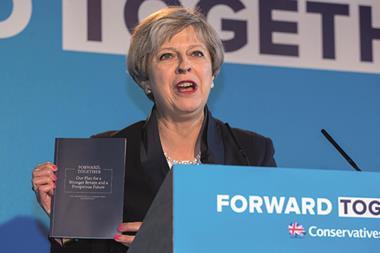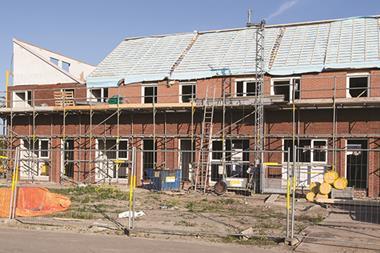Labour leader Jeremy Corbyn has used his closing speech at the party’s annual conference in Brighton to commit to introducing rent controls and a compulsory purchase policy for undeveloped land.

Corbyn said a Labour government would stop developers “land-banking” as well as introducing new taxes to support the building of more social housing.
Delivering an hour-long speech to party members, Corbyn pledged that regeneration under a Labour government would be “for the benefit of the local people not private developers, not property speculators”.
Advocating a ‘use it or lose it’ policy for undeveloped land with regeneration potential, the Labour leader said: “We need to tax on land held by developers and have the power to compulsory purchase.
“Families need homes: after Grenfell, we must think again about what are called regeneration schemes. Regeneration is a much-abused word. Too often, what it really means is false gentrification and social cleansing. As private developers move in and tenants and leaseholders move out, we are very clear we will stop the cuts to social security.”
Find out more: Next time the Tories must offer a positive vision
In addition to advocating wider compulsory purchase powers, Corbyn said a Labour government would definitely introduce rent controls.
“We will control rents - when the younger generation’s housing costs are three times more than those of their grandparents, that is not sustainable. Rent controls exist in many cities across the world and I want our cities to have those powers too and tenants to have those protections.”
While he didn’t elaborate further how rent controls might be implemented, he did return to the topic of redevelopment policy proposing that “councils [would] have to win a ballot of existing tenants and leaseholders before any redevelopment scheme can take place”.
Housing Minister Alok Sharma recently discussed the introduction of rent controls at RESI 2017, describing them as “an agenda of the Marxists”. “Let me be absolutely clear: under this government rent controls are not going to happen,” he added.
Find out more: Home address - Alok Sharma’s RESI 2017 speech
Property reacts
Jean-Marc Vandevivere, chief executive of PLATFORM_, said: “Rent controls have proven ineffective in other countries. They would also have a dramatic and immediate impact on the appetite of investors in the UK housing sector at a time when it is clearly needed.
“From a build-to-rent perspective, the industry has worked hard to attract foreign investors who have now started to invest into this burgeoning sector, providing an effective housing solution in addition to the traditional homeownership model. Even the housing charity Shelter has said that rent controls could lead to massive sell offs of buy-to-let properties, restricting choice and potentially forcing vulnerable people into homelessness. Many in the sector work hard on the affordability side, PLATFORM_ ensures that all of our flats are affordable for at least 60% of the local force.”
Adam Challis, head of residential research at JLL, said: “Jeremy Corbyn has put housing squarely back in the centre of the domestic political agenda. It is right that we uphold the emerging lessons from the Grenfell Tower fire and continue to learn from that terrible disaster. Other elements of the speech, such as rent controls, should be viewed with caution. There is a wide swathe of examples - including pre-1989 in the UK itself - that show the negative impacts of tight controls on rents.
“We do not want to return to an era of slum landlords - the private renters experience can be difficult enough as it is. However, Corbyn is right to be looking at rental costs and the aim of transparency over future costs would be of great help to tenants. It should be explicit in rental agreements that a reasonable rate of growth, perhaps in line with inflation, is to be expected.”
David Cox, chief executive of ARLA Propertymark, said: “The Labour Party clearly hasn’t learnt the lessons of history. The last time rent controls existed the private rented sector went from housing 90% of the population to just 7%. Whenever and wherever rent controls are introduced, the quantity of available housing reduces significantly, and the conditions in privately rented properties deteriorate dramatically.
“Landlords, agents, and successive Governments over the last 30 years have worked hard to improve the conditions of rented properties and this is like taking two steps backwards. Rent control is not the answer – to bring rent costs down we need a concerted house building effort to increase stock in line with ever-growing demand.”
RLA policy director David Smith said: “The proposals to control rent will concern private landlords. Contrary to suggestions, most landlords have one or two properties, which are an investment in their pension and, rather than being wealthy landowners, they are mainly basic rate taxpayers.
“The private rented sector is a key part of providing more housing and has invested in providing homes for the population, putting more homes into use than other landlord types. Rents are high due to the continued failures by successive governments of all stripes to build enough new homes in the right places. Instead of attacking landlords who are helping to provide homes, it would be better to treat them as part of the solution and to supplement their efforts with a sustained and well thought out building programme overseen by government. ”






























No comments yet